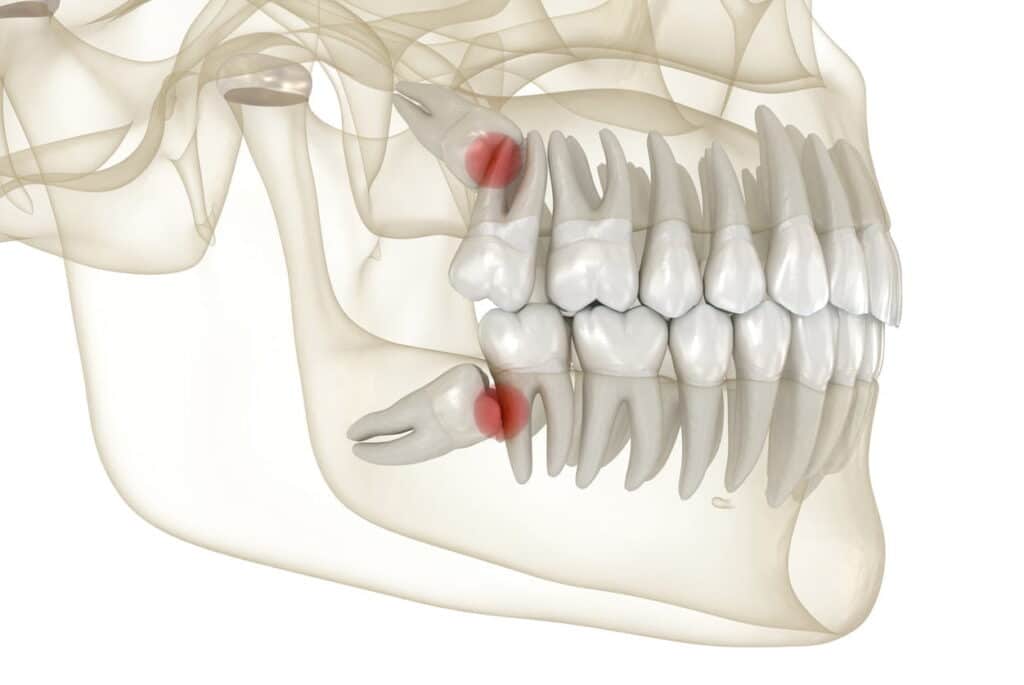Wisdom teeth extraction is a common dental procedure aimed at removing the third molars, also known as wisdom teeth. These teeth typically erupt during late adolescence or early adulthood and can often cause various complications such as overcrowding, misalignment, infection, or damage to neighboring teeth if left untreated. To prevent these complications from arising or worsening over time, dentists often recommend removing problematic wisdom teeth before they cause any further harm.

Potential Risks of Wisdom Teeth Extraction
While wisdom teeth extraction is a common dental procedure, it's important to be aware of the potential risks associated with it. Although these risks are relatively rare, being informed can help you make an educated decision about whether or not to undergo this procedure.
- One possible risk is infection. After the surgery, there is a small chance that bacteria may enter the extraction site and cause an infection. Symptoms of infection include swelling, pain, and discharge from the site. It's crucial to follow your dentist's instructions for postoperative care to minimize this risk.
- Another potential risk is a dry socket. This occurs when the blood clot that forms after tooth extraction becomes dislodged or dissolves prematurely. A dry socket can lead to severe pain and delay healing time. To reduce the chances of developing a dry socket, avoid smoking or using straws in the days following your surgery.
- Nerve damage is also a possibility during wisdom teeth extraction. The nerves located near your lower wisdom teeth could potentially be injured during the procedure, resulting in numbness or tingling sensations in your tongue, lips, or chin area. While nerve damage is uncommon, it's important to discuss this risk with your dentist before undergoing any oral surgery.
- There may be complications related to anesthesia used during the procedure. These can range from mild allergic reactions to more serious complications such as respiratory problems or cardiovascular issues. Your dentist will review your medical history thoroughly prior to administering anesthesia and take all necessary precautions.
Keep in mind that these risks are generally low, and most people experience smooth recovery without any major complications after wisdom teeth extraction. However, discussing these potential risks with your dentist beforehand will ensure you have all the necessary information regarding this dental procedure.
Wisdom Teeth Extraction Preparation and Process
The wisdom teeth extraction process can vary depending on the individual's specific situation. Before the procedure, your dentist or oral surgeon will thoroughly evaluate your teeth and determine if extraction is necessary. This evaluation may involve dental X-rays to assess the position and condition of your wisdom teeth.
Once it's determined that extraction is needed, local anesthesia will be administered to numb the area around the tooth. In some cases, sedation anesthesia may also be used to help you relax during the procedure.
Then the actual extraction begins where an incision may be made in your gum tissue to access the tooth. If there isn't enough space for easy removal, your dentist or oral surgeon might need to remove the bone surrounding the tooth or divide it into smaller pieces for easier extraction. After removing all necessary tissues, stitches may be placed if needed.
Following surgery, it's important to follow any postoperative instructions provided by our dentist or oral surgeon closely. This can include taking prescribed pain medication as directed and maintaining good oral hygiene practices like gently rinsing with warm saltwater. The length of time for healing after this procedure varies from person to person but typically takes a few days up to a week.

Frequently Asked Questions
Q. Will I be able to drive myself home after wisdom teeth extraction?
A: Absolutely not! Driving yourself home after wisdom teeth extraction is strongly discouraged. The procedure involves the use of anesthesia, and its effects can linger for a few hours afterward. As such, it is crucial to arrange for someone responsible to pick you up from the dental office and drive you back home safely. Attempting to operate a vehicle while under the influence of anesthesia can pose serious risks, both to yourself and others on the road.
Q. Will I be in pain after wisdom teeth extraction?
A: It's normal to experience some level of discomfort following wisdom teeth extraction. However, every individual's pain threshold varies. After the procedure, your dentist will likely prescribe pain medication or recommend over-the-counter pain relievers like ibuprofen. Following these recommendations diligently will help manage any potential post-extraction soreness effectively.
Q. What can I eat after wisdom teeth extraction?
A: After wisdom teeth extraction, it is crucial to select foods that are soft, easily chewable, and gentle on the healing gums. Opt for nutritious options like smoothies, soups (not too hot), mashed potatoes or sweet potatoes, yogurt, applesauce, cottage cheese, scrambled eggs, oatmeal with milk or water (avoid adding nuts or seeds), steamed vegetables (make sure they are not too hard), and gelatin desserts. These choices will provide you with essential nutrients while minimizing discomfort during the healing process. Remember to avoid consuming foods that are sticky, crunchy, spicy, or require excessive chewing, as they may irritate the surgical site and impede proper healing.
If you have been experiencing problems with your wisdom teeth or if your dentist has recommended their removal preemptively, don't hesitate to seek professional advice. Consulting with our qualified dental professional will allow you to fully understand your unique situation and make informed decisions about your oral health.
Visit Our Office
Office Hours
- MON - THU8:30 am - 5:00 pm
- FRIBy appointments only
- SAT - SUNClosed
